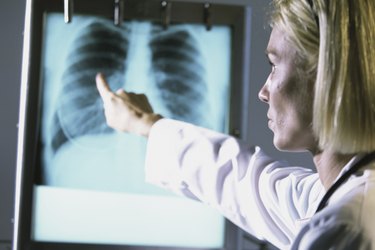
Inhaling food into your lungs -- known as aspiration -- can cause serious complications, especially if you have a condition that makes you aspirate food or fluids on a regular basis. According to an article published in 2011 by "Critical Care Medicine," aspiration is the leading cause of pneumonia in the intensive care unit. A piece of tissue called the epiglottis normally prevents food from entering your lungs by covering your trachea, or windpipe, as you're swallowing. From time to time, you may accidentally take food into your trachea while you're eating. If you're healthy and have a strong immune system, you may not have any complications from an isolated incident.
Causes
Video of the Day
Swallowing difficulties, altered cognitive status, an impaired gag reflex or heavy alcohol use may increase your risk of aspiration. Conditions like gastroesophageal reflux disease, which may lead to a narrowing of the esophagus, or food tube, can also make you more likely to aspirate food or fluids. If you have shortness of breath, coughing, wheezing or chest pain after eating, you may have aspirated food. Blockage of a respiratory passage may cause your skin to turn a bluish color due to lack of oxygen. If you have a condition that makes you aspirate small amounts of food or liquid frequently during meals, you may develop a cough with foul-smelling sputum, bad breath, increased swallowing difficulty, fatigue and dizziness.
Video of the Day
Complications
Food or fluids in your air passages may trigger an inflammatory response as your lungs react to the foreign substance. Fluid may accumulate in your lungs if a passage is blocked. If an infection occurs, you may develop bacterial pneumonia. Having asthma or emphysema may increase your risk of developing pneumonia after aspiration. People who smoke, the elderly and people whose immune systems are weakened by other medical conditions are more susceptible to pneumonia.
Diagnosis and Treatment
Your doctor may be able to tell whether you've developed aspiration pneumonia by listening to your lungs with a stethoscope. He or she may order blood or sputum tests, swallowing evaluations, a chest x-ray or CT scan to check for abnormal areas in your lungs. If you've developed aspiration pneumonia, you may require hospitalization and antibiotics to treat the infection. If you have a solid piece of food lodged in your lungs, you may need to have the object removed with a bronchoscope, an instrument that enters your lungs through your mouth, to retrieve the object.
Prevention
To avoid inhaling food into your lungs, take small bites, chew your food thoroughly and avoid talking or laughing while you're chewing. If you have consistent difficulty swallowing solid foods, your doctor may recommend a soft diet or a liquid diet to maintain your nutritional intake while minimizing your risk of aspiration. A gurgling sound when you're eating, pain while swallowing or having a sense that something is stuck in your throat after a meal may indicate that you're aspirating. If you have symptoms of aspiration, consult your doctor about dietary changes that may reduce your risk of pneumonia or other complications.
Is this an emergency? If you are experiencing serious medical symptoms, please see the National Library of Medicine’s list of signs you need emergency medical attention or call 911.